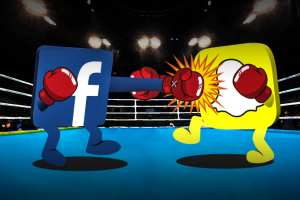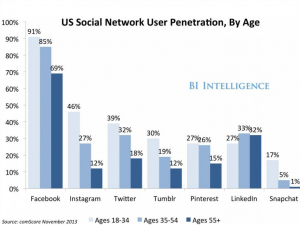Over the past decade, social media has become a phenomenon that has rapidly evolved, cementing itself as second nature for most individuals. Industry leaders have found themselves in a hectic toe-to-toe race, seeking to grab the attention of users and gain an inch over their fierce competitors.
A recent article suggests that Snapchat may just have forgotten to tie their laces in such a heated race, with Facebook attempting to prohibit its rise as the ultimate social media platform. Snapchat has become notorious for its multitude of features that cater to the millennial and Generation Z demographic, from offering appealing filters, stories to broadcast the entertaining moments of your life, and streaks to boast imaginative popularity points. In an attempt to overshadow their success, Facebook has recently implemented similar features.
Although the article proposes a valid argument, it is easy to disagree with the notion that this will lead to the inevitable downfall of Snapchat, assessed through both personal experiences, and several marketing analysis tools. It is evident that Facebook is seeking a transient advantage- the necessity of frequently generating new advantages and cementing them, as opposed to building a single one, and defending it. Such is necessary for a company to strive, however the critical issue at hand is that these features have already been flawlessly established by Snapchat, and are not new or innovative by any means. More importantly, Facebook has a dominant over-35 and elder demographic which simply and statistically do not find the appeal in these new features, resulting in Facebook’s recent implementations essentially becoming irrelevant.
Although it can be difficult to establish a transient advantage or a deal-breaking point of difference between companies with similar value propositions, Facebook’s recent actions, in my opinion, have demonstrated a poor customer segmentation strategy. Speaking from personal experience, a vast majority of users make little to no use of Facebook’s story feature, and have opted to continue using Snapchat. The fact of the matter is, “young users don’t want to be on the same social network as their parents, grandparents or teachers”.
Snapchat has done a great job of keeping their users within the loyalty loop of the consumer decision journey- consistent updates, new filters, and lack of scandals as opposed to Facebook have enabled them to prosper, and will allow them to continue rising amidst their fierce competition. Ultimately, I must disagree with the notion that Facebook is soon to knock out Snapchat from the race. Each platform has a specific time-frame under which they strive, and if Facebook fails to obtain an innovative transient advantage in the future, they may find themselves following the footsteps of dead platforms, such as mySpace. Snapchat is only beginning its rise.
Word Count: 450


